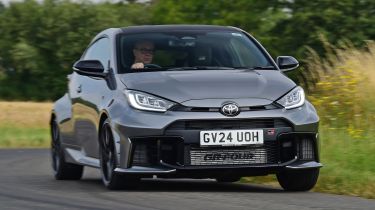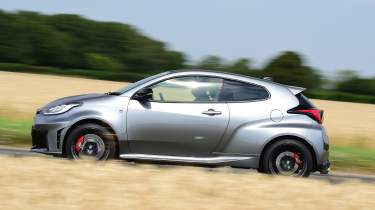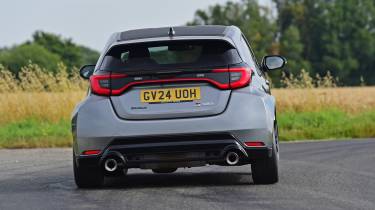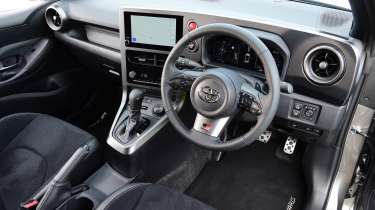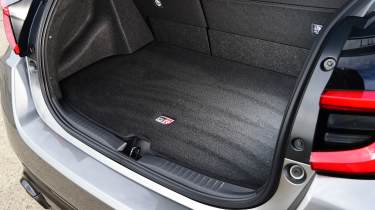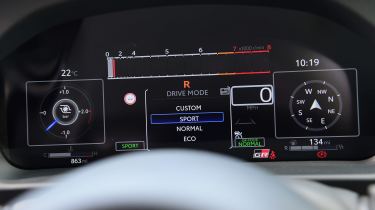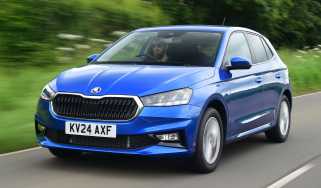Toyota GR Yaris review - from supermini to supercar slayer
"The Toyota GR Yaris is a once-in-a-generation rally special, serving up a seriously impressive driving experience"
Pros
- Rally pedigree
- Brilliant to drive
- Rarity
Cons
- Firm ride
- Fuel economy
- No back doors
Verdict – is the Toyota GR Yaris a good car?
Its £44k price tag might seem a bit rich, but think of the Toyota GR Yaris as the ultimate and relatively unhinged swansong to the rally-inspired era of hot hatchbacks and it feels more appropriate. The simple fact is that Toyota isn’t likely to build another petrol, turbocharged and four-wheel drive supermini, and the GR Yaris ticks all the right boxes for enthusiasts. Most other manufacturers are dropping out of this niche too, replacing their sporty small cars with electric models. Sure it’s pretty thirsty and lacks some refinement, but as a fun toy, the GR Yaris is hard to beat.
Toyota GR Yaris models, specs and alternatives
Don't dismiss the Toyota GR Yaris as any old hot hatchback with stiff suspension, a tuned engine and bigger brakes. When Toyota returned to the World Rally Championship in 2015, part of its plan was to build an affordable rally-inspired sports car, and the GR Yaris is the tantalising result.
It sits on a unique platform that fuses parts from the latest Yaris with the rear section used for the larger Toyota Corolla and Toyota C-HR models. It's now a three-door hatchback, its roof is now 91mm lower and the GR looks like it's been gulping protein shakes, with swollen wheel arches and a massive front grille. To keep the weight down, the car has a forged carbon composite roof and an aluminium bonnet, hatchback and doors.
The facelifted version launched in 2024 looks ostensibly the same, albeit with some tweaks that aren’t just aimed at keeping it fresh, but also at making it more robust. For instance, the front bumper is now in three parts instead of one to make it cheaper to replace bits if it gets damaged, and the plastic mesh has been replaced with metal to better fend off debris.
More reviews
The engine is special too – a 1.6-litre turbocharged petrol originally with 257bhp that's the world's most powerful three-cylinder in a mass-produced car – and has now been beefed up to a heady 276bhp. Four-wheel-drive traction helps the GR Yaris rocket from 0-62mph in 5.2 seconds, and on the road, it feels seriously quick across the ground. Its four-wheel drive system can be adjusted to send more or less of the engine’s torque to the front wheels, or to the rear axle, altering how the car behaves on the road, track or loose surfaces. The standard six-speed manual gearbox also has rev-matching (that can be turned on or off) to perfectly blip the throttle as you downshift, and for 2024 there’s now an eight-speed automatic for an extra £1,500.
 The 10 best hot hatchbacks to buy in 2025
The 10 best hot hatchbacks to buy in 2025
Speaking of pricing, the GR Yaris certainly isn’t cheap, with its starting price spiralling by more than £12k since it first arrived and the facelifted car costing from £44,000. While this might seem like a crazy figure for a Yaris, we’re living in a world where the Honda Civic Type R costs just over £50,000 and Toyota has realised that most GR Yaris customers own a collection of performance cars.
Previously, buyers could upgrade to the ‘Circuit Pack’ to add locking differentials for extra traction, along with red brake callipers, firmer suspension and forged 18-inch alloy wheels with Michelin Pilot 4S tyres. The standard car came with cast 18-inch alloy wheels and less aggressive Dunlop tyres. However, for the 2024 refresh there’s been a change of strategy, so buyers now get stiffer suspension, limited-slip differentials and 18-inch BBS 10-spoke forged alloy wheels as standard.
An impressive transformation then, but what you can't glean from the spec sheet is the development input from Toyota's rally drivers. It's evident as soon as you slip into the GR's bucket seats, fire up the engine and head along a twisting B road because the car doesn't drive like an ordinary supermini. Its instant steering, incredible chassis and powerful brakes make it faster than most sports cars through a challenging set of bends.
MPG, running costs & CO2
It may be a surprisingly hardcore performance car, but the GR Yaris still uses a sensibly sized 1.6-litre engine with just three cylinders and a turbocharger, so it can be somewhat economical when you aren't pretending to be a rally driver.
It can return up to 32.5mpg with the manual gearbox, which is almost exactly half as much as the regular Yaris, but it's best not to think about that. It makes more sense to compare the GR Yaris to other hot hatchbacks, including the Honda Civic Type R (33.2mpg), Ford Focus ST (34.4mpg) and Hyundai i30 N, which also manages 34mpg. CO2 emissions of 197g/km mean the rally-inspired Toyota is very unlikely to crop up on company-car lists, but it only costs the standard VED rate each year in road tax.
Plump for the automatic and things are even less frugal, with fuel efficiency dropping to a maximum of 29.7mpg and emissions creeping up to 215g/km of CO2. No surprise then, that Toyota is only selling the GR Yaris in limited numbers in the UK, most likely for fear it could harm its fleet average CO2 figures.
Engines, drive & performance
A Toyota Yaris with the performance of a Subaru Impreza? Yes, for the first time since the Celica GT4 arrived around two decades ago, Toyota has decided to create a proper rally car for the road. That's no exaggeration: the GR (for Gazoo Racing, Toyota's motorsport division) Yaris was dreamt up to form the basis of Toyota's 2021 World Rally Championship contender, with 25,000 road-going versions planned for production to homologate the rally car.
As a result, the GR Yaris is no mere makeover, with two less doors than the standard model, pumped-up looks and much bigger wings and spoilers than the standard Yaris hybrid. It also has four-wheel drive that can be switched between Normal (mostly front-wheel drive), Sport (mostly rear-wheel drive) and Track (50:50 power distribution) driving modes to alter the character of the car. Previously, tick the box marked ‘Circuit Pack’, and locking differentials were fitted to the axles, the suspension was swapped for a firmer system and a set of red brake callipers were also added to its Toyota Supra-derived brakes.
This no longer exists for the facelifted GR Yaris, with Toyota instead deciding to give every buyer the full experience. In fact, its suspension is even firmer, along with its anti-roll bars, and every car now gets 18-inch BBS 10-spoke forged alloy wheels shod in Michelin Pilot Sport 4S tyres and those red calipers.
The engine was new as well. It's a 1.6-litre, three-cylinder petrol that was turbocharged to produce 257bhp when the car launched, with power increased to 276bhp from 2024. This makes it similar to the engine in the old Ford Fiesta ST – albeit with considerably more horsepower – and it serves up impressive acceleration on the move. Thanks to the traction of its four-wheel-drive system and relatively low weight (at 1,280kg it weighs around 100kg less than a Civic Type R), it gets the Yaris from 0-62mph in a class-leading 5.2 seconds – three tenths faster than before.
It's an intriguing recipe, and the good news is that the GR Yaris feels as good to drive as it looks on paper. The suspension is bordering on too firm for UK roads, but the resulting body control and response from the steering and brakes is incredible. On many roads – especially ones that twist and turn, and are possibly slightly damp – the GR Yaris could get from A to B faster than many supercars. The upgraded engine certainly has no problem firing the Yaris out of corners and along the next straight, even if the sound it makes is sometimes a bit gruff.
When we tested the facelifted GR Yaris in the UK, it was also fitted with the new eight-speed automatic gearbox, giving buyers another version to pick. While pootling around it shifts gears early, making use of the engine’s torque and maximising economy, but flicking the lever to the side switches it into manual mode. There are shift paddles behind the steering wheel, which is more rewarding, but in a car like this we’d be inclined to stick with the manual unless circumstances dictated otherwise.
Interior & comfort
It might be a homologation rally car but things have come on a bit since the stripped out Imprezas and Evos that were launched in the ‘90s and early ‘00s. The Yaris still has plenty of refinement and mod cons, with luxuries extending to a JBL sound system, air conditioning, navigation, a blind-spot monitor, and even a head-up display.
While it looks far more aggressive from the outside, the main changes inside the GR Yaris are its figure-hugging bucket seats, sports instruments (that now read to 180mph), metal pedals and thick-rimmed steering wheel. There's also a button marked 'IMT' near the gear lever that stands for Intelligent Manual Transmission, which automatically blips the throttle on downshifts.
Toyota has also done lots of work to address criticisms of the pre-facelift car, so you now sit lower in the driver’s seat, the rear-view mirror has been moved higher up to give a better view out, and the dashboard has been completely redesigned. While it still eschews such fripperies as soft-touch materials, the new layout is driver-focussed and no-nonsense, not only giving it a purposeful aesthetic but hopefully meaning it also shouldn’t date too badly.
Practicality & boot space
Buyers clearly won't be choosing the GR Yaris for its practicality – it not only loses two doors compared with the standard Yaris, but the roof is also 91mm lower. However, there's still plenty of space in the front and the car feels pretty similar to any other supermini. Thanks to the aforementioned changes for the facelift, forward visibility is also quite a bit better than before.
Getting in the back is clearly not as easy, and putting a child-seat in the rear seats will also be much more of a faff than with the standard five-door. The boot is smaller, not only because the roofline is lower but because of modifications such as relocating the battery under the luggage compartment to improve weight distribution. The boot measures 174 litres (down from 281 litres in the standard Yaris) but Toyota claims that with the rear seats folded there's enough space for a new set of four car tyres or a bicycle. Still, this figure is less than most city cars offer, and the Honda Civic Type R has a huge 410-litre boot in comparison, so along with its back doors and sizeable rear seats, it’s a far more family-friendly hot hatch if it’s your only vehicle.
Reliability & safety
The standard Toyota Yaris has already achieved a five-star safety rating from Euro NCAP, and we expect this to also translate to the GR Yaris. It's fitted with Toyota Safety Sense as standard, including autonomous emergency braking, Lane Departure Alert and even adaptive cruise control.
Toyota also has a strong reputation amongst owners, coming 12th out of 32 manufacturers in our 2023 Driver Power survey. Of all those who responded, just 15% of Toyota owners reported one or more faults with their car in the first year of ownership, which is lower than average.
Intriguingly, a few of the changes made to the facelifted Yaris GR have come from the experiences Toyota has gained from motorsport and lots of examples of the car being driven hard and on track. Examples include the move from plastic to tougher metal front grille mesh, making the front bumper a three-part piece for easier and cheaper repairs and altering the back bumper to stop it from being damaged by a scorching hot exhaust. The chassis and engine have also been fitted with some upgraded parts to ensure they’re even more robust.
